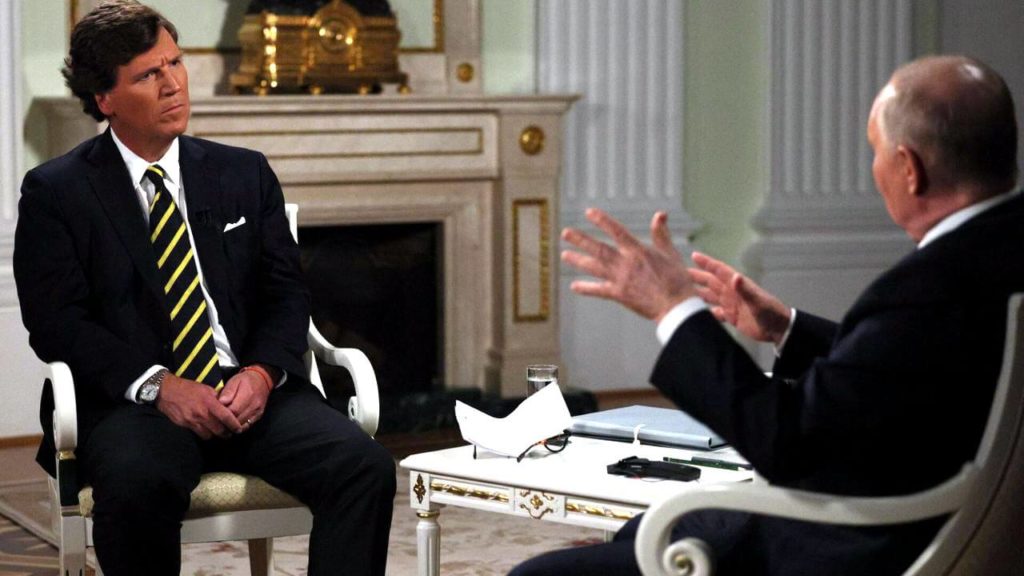The Tucker Carlson Interview with Putin Through the Lens of the Scrum Framework
In the landscape of contemporary media, where sensationalism often eclipses substance, certain events stand out not just for their significance but also for their potential to spark unconventional lines of thought.
The recent interview between American journalist Tucker Carlson and Russian President Vladimir Putin, held on February 6th, 2024, is poised to become one such landmark moment.
While the reasons behind its potential viral nature remain open to interpretation, we’ll set aside conjecture and instead embark on an intriguing thought experiment.

The Tucker Carlson Interview with Putin Through the Lens of the Scrum Framework
At first glance, the realms of geopolitics and project management might seem light-years apart. Yet, upon closer examination, parallels emerge.
Consider the fundamental principles of the Scrum framework: transparency and inspection. In Scrum, stakeholders are invited into the process, with product owners elucidating the vision and backlog, and regular inspections through daily scrums and sprint reviews ensuring alignment with objectives.
Similarly, the Carlson-Putin interview sought to peel back the layers of opacity surrounding Putin’s perspectives and actions. Much like the scrutiny applied in a Scrum review, Carlson’s probing questions aimed to shed light on motives and decision-making processes.
Whether dissecting the ongoing Ukrainian crisis or delving into broader geopolitical strategies, the interview offered a rare glimpse into the inner workings of international relations, mirroring the ethos of transparency inherent in Scrum.
Adaptation and Flexibility in Dialogue
In both the Scrum framework and the dynamics of dialogue between Carlson and Putin, adaptation plays a pivotal role. Just as Scrum teams pivot based on feedback and changing priorities, so too did the interview participants navigate shifting conversational currents.
Carlson, employing a nuanced approach to uncovering truths, likely adjusted his line of inquiry in response to Putin’s rhetoric, akin to a sprint team refining its strategy in light of emerging challenges.
Putin, likewise, demonstrated a penchant for adaptability, wielding language, and argumentation as tactical tools in a high-stakes verbal sparring match, even though he was not pleased with interruptions at the beginning of the interview.
Despite Carlson’s suspicions of filibustering tactics, Putin’s responses likely reflected a calculated flexibility, mirroring the agile mindset espoused in the Scrum ethos.
Teamwork and Collaboration Under Fire
While teamwork may not be the foremost association with either international diplomacy or project management, its echoes resound in unexpected places.
In the crucible of the Carlson-Putin interview, a form of forced collaboration emerges, as both parties navigate the terrain of dialogue with divergent objectives in mind.
Effective communication, coordination, and the pursuit of common ground underpin the essence of collaboration, whether in the boardroom or the geopolitical arena.
While the Carlson-Putin interview may seem worlds apart from the Scrum Framework, our thought experiment reveals intriguing parallels.
Just as Scrum fosters adaptive thinking and collaborative problem-solving in the realm of project management, so too does the dialogue between Carlson and Putin serve as a crucible for intellectual agility and strategic maneuvering on the global stage, leading to the potential exchange of prisoners on both sides in the near future.
Conclusion
The exploration of such unlikely analogies serves not only to broaden our conceptual horizons but also to underscore the universal principles that underpin effective human interaction, whether in the realm of project management or international diplomacy.
Additionally, it highlights the versatility of the Scrum framework, which transcends industry boundaries and can be adapted to various fields, including technology, healthcare, finance, and more.
Let us remain open to the possibilities that emerge when disparate domains intersect, sparking new avenues of insight and understanding.
By embracing the principles of transparency, collaboration, and adaptability inherent in Scrum, organizations across diverse sectors can enhance their agility, productivity, and ultimately, their success.
Now, you have 2 options…
If you’re intrigued by the potential applications of Scrum in enhancing your personal and organizational effectiveness, consider signing up for our FREE Scrum Workshop. There, you’ll delve deeper into the methodologies and strategies that can drive success in today’s dynamic landscape.
Alternatively, you can choose to maintain the status quo, opting for inertia over innovation. However, remember that without change, growth stagnates, and opportunities for advancement may remain unrealized.
I trust you’ll make the choice that aligns with your aspirations for continued success.
To your continued success,
Dejan Majkic
